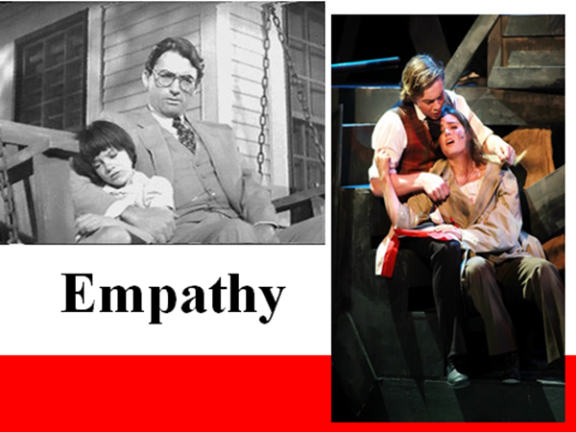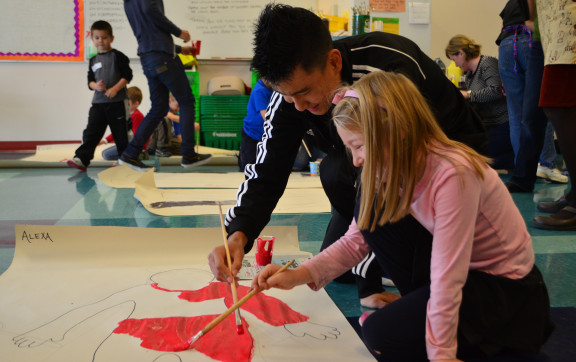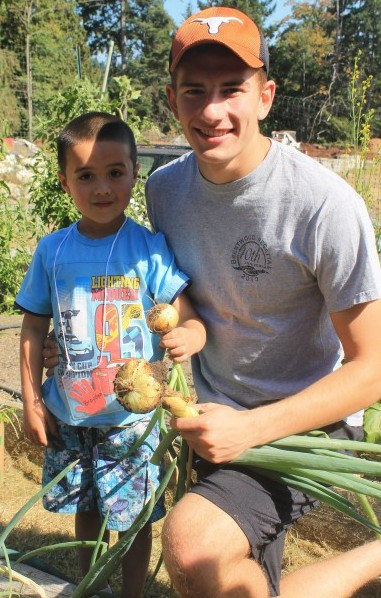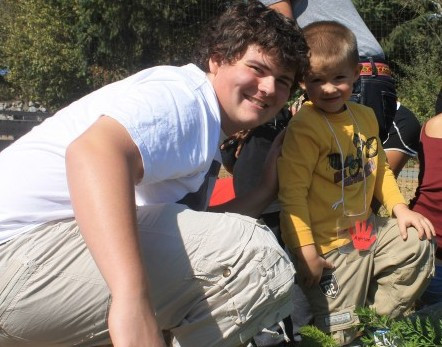50p

Empathy
Empathy: The word for the day - the practice for life.
Empathy is not sympathy. It is not feeling badly for someone else. It is feeling with someone, what it would be like to be that person; it is climbing into another’s mind to experience the world from that person’s perspective.
“Empathy allows us to see the other side of an argument, comfort someone, and bite our lip instead of saying something cruel.” (Pink) We learn to understand one another’s intentions and motivations, connecting us within a group. Thinking of oneself too much can contract our world; thinking of others enlarges it.
Empathy is also one of the seven intelligences identified by Howard Gardner in his seminal work on the Theory of Multiple Intelligence. He refers to it as “Interpersonal intelligence”.
It may surprise you but at Brentwood, we educate not for the ability to take tests; we educate for life. Learning to work with others and collaborate are essential skills for both personal and professional success. To do well you need be empathetic. More and more medical schools, for example, are teaching compassion-care educational courses, as studies show patients are more satisfied with empathetic doctors.
At Brentwood we offer many opportunities for you to learn, experience, and practice empathy in the Houses, classrooms, sports field, art studios and volunteer work. As I have some small interest in Arts, my examples today come from that field of play.
In the studios, artists build relationships across time and space as well as with ideas and feelings. They open themselves to critique through the creative process. Empathy is a key piece in this. It is what allows artists to risk and share, knowing that they will be supported in their efforts to create. When you read their images in a painting for example, you are putting yourself in the shoes of the artist. You connect with that person’s values and perception of the world. You can see the world through different eyes.
In the performing arts, actors practice empathy when they study how someone else feels and they experience that person’s emotions as one’s own.
When you, as an audience member, watch a concert or any performance, you understand the risks taken by the performers to put themselves out here on stage in front of their peers and public. You respect that challenge, which for some is quite daunting, with your support and focus.
Atticus Finch, the wise father in Harper Lee’s novel “To Kill a Mockingbird” shares with his daughter, Scout, many life lessons about empathy as she struggles to understand her neighbours’ prejudices, biases and racism.
After Boo Radley has saved Scout’s life, they stand together on his porch looking down her street, she recalls her father’s words: “Scout, you need to learn one trick in life to get along with people. You never really know a man until you stand in his shoes and walk around in them”. It is a good trick to learn. From his front porch, Scout has finally seen the world from Boo’s perspective.
Every day, try to make a point of standing in someone else’s shoes and walking around in them. Doing this is a courageous leap of your imagination, an opportunity to enlarge your world and perspective.
Mrs. Edna Widenmaier, Director of Arts
Empathy is not sympathy. It is not feeling badly for someone else. It is feeling with someone, what it would be like to be that person; it is climbing into another’s mind to experience the world from that person’s perspective.
“Empathy allows us to see the other side of an argument, comfort someone, and bite our lip instead of saying something cruel.” (Pink) We learn to understand one another’s intentions and motivations, connecting us within a group. Thinking of oneself too much can contract our world; thinking of others enlarges it.
Empathy is also one of the seven intelligences identified by Howard Gardner in his seminal work on the Theory of Multiple Intelligence. He refers to it as “Interpersonal intelligence”.
It may surprise you but at Brentwood, we educate not for the ability to take tests; we educate for life. Learning to work with others and collaborate are essential skills for both personal and professional success. To do well you need be empathetic. More and more medical schools, for example, are teaching compassion-care educational courses, as studies show patients are more satisfied with empathetic doctors.
At Brentwood we offer many opportunities for you to learn, experience, and practice empathy in the Houses, classrooms, sports field, art studios and volunteer work. As I have some small interest in Arts, my examples today come from that field of play.
In the studios, artists build relationships across time and space as well as with ideas and feelings. They open themselves to critique through the creative process. Empathy is a key piece in this. It is what allows artists to risk and share, knowing that they will be supported in their efforts to create. When you read their images in a painting for example, you are putting yourself in the shoes of the artist. You connect with that person’s values and perception of the world. You can see the world through different eyes.
In the performing arts, actors practice empathy when they study how someone else feels and they experience that person’s emotions as one’s own.
When you, as an audience member, watch a concert or any performance, you understand the risks taken by the performers to put themselves out here on stage in front of their peers and public. You respect that challenge, which for some is quite daunting, with your support and focus.
Atticus Finch, the wise father in Harper Lee’s novel “To Kill a Mockingbird” shares with his daughter, Scout, many life lessons about empathy as she struggles to understand her neighbours’ prejudices, biases and racism.
After Boo Radley has saved Scout’s life, they stand together on his porch looking down her street, she recalls her father’s words: “Scout, you need to learn one trick in life to get along with people. You never really know a man until you stand in his shoes and walk around in them”. It is a good trick to learn. From his front porch, Scout has finally seen the world from Boo’s perspective.
Every day, try to make a point of standing in someone else’s shoes and walking around in them. Doing this is a courageous leap of your imagination, an opportunity to enlarge your world and perspective.
Mrs. Edna Widenmaier, Director of Arts
75p



